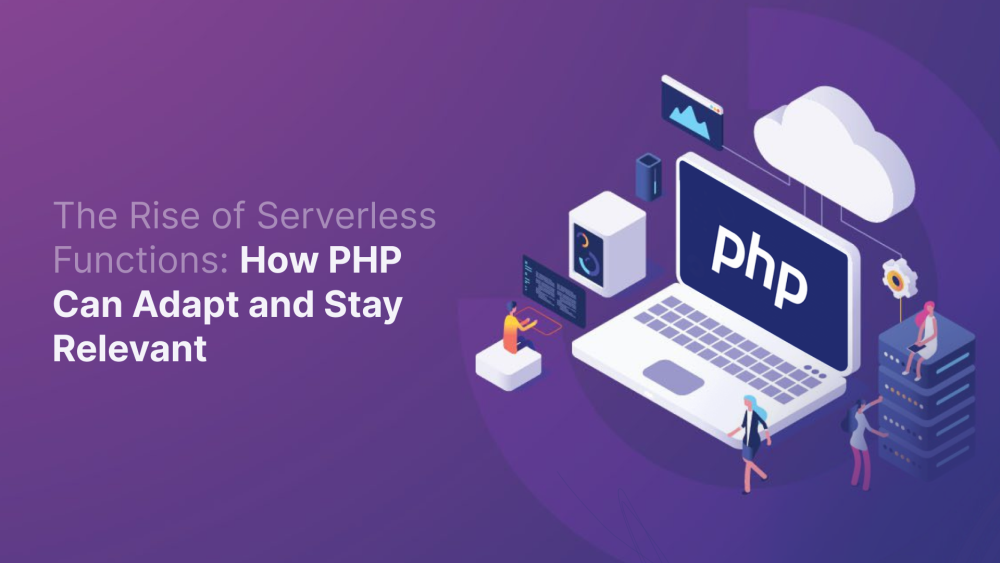The cloud computing landscape is undergoing a significant shift with the rise of serverless functions. This innovative approach eliminates the need for developers to manage servers, allowing them to focus on building and deploying code. While serverless functions are often associated with newer languages like Node.js or Python, PHP can also adapt and thrive in this evolving environment. This blog explores the serverless revolution, how PHP can leverage its strengths to stay relevant, and the benefits it offers across various industries.
Understanding Serverless Functions: A Paradigm Shift
Traditional web applications require provisioning, managing, and scaling servers. Serverless functions, on the other hand, operate on a "pay-per-use" model. Here's how it works:
-
Event-Driven: Code execution is triggered by specific events, such as an API call, a database change, or a scheduled task.
-
Managed Infrastructure: Cloud providers handle server provisioning, scaling, and maintenance, freeing developers from these complexities.
-
Cost-Effective: Users only pay for the compute resources consumed during function execution, leading to significant cost savings for applications with variable workloads.
Statistic: According to Gartner, by 2022, serverless functions will be the preferred method for deploying over 80% of all new cloud applications.
Why Serverless? Advantages Over Traditional PHP Applications
Serverless functions offer several advantages over traditional PHP applications deployed on dedicated servers:
-
Faster Development and Deployment: Eliminate server management tasks, accelerating development and deployment cycles.
-
Scalability: Serverless architectures automatically scale to meet demand, eliminating concerns about infrastructure bottlenecks.
-
Reduced Costs: Pay only for the resources used, offering significant cost savings compared to maintaining dedicated servers.
-
Improved Developer Experience: Focus on writing clean code, leaving server management to the cloud provider.
How PHP Can Embrace the Serverless Revolution: Tools and Techniques
Despite these advantages, some might question the role of PHP in the serverless world. Here's how PHP can adapt and thrive:
-
Serverless Frameworks: Frameworks like Bref, Serverless PHP, and OpenFaas provide tools and libraries for building, deploying, and managing PHP serverless functions on major cloud platforms like AWS Lambda and Azure Functions.
-
Event-Driven Architecture: Utilize libraries and frameworks that enable PHP applications to react to events from various sources, integrating seamlessly with serverless environments.
-
Microservices Architecture: Break down large PHP applications into smaller, independent microservices that can be deployed as serverless functions, promoting modularity and scalability.
Example: A social media platform might leverage serverless PHP functions for tasks like sending user notifications, processing image uploads, or triggering background jobs, all triggered by specific events.
Industry-Specific Use Cases and Benefits: PHP in Action
Serverless PHP functions can be applied across a variety of industries:
-
E-Commerce: Implement real-time order processing, personalized product recommendations, and dynamic pricing updates using serverless PHP functions triggered by customer actions.
-
Media and Entertainment: Process video uploads, generate content previews, and trigger real-time content analytics using serverless PHP functions.
-
Finance: Perform fraud detection, trigger automated risk assessments, and implement real-time account balance updates using serverless PHP functions.
These examples showcase the versatility of PHP in serverless environments, offering significant benefits for businesses:
-
Improved User Experience: Faster response times and real-time functionality enhance user experience across various applications.
-
Reduced Operational Costs: Pay-per-use model and simplified infrastructure management lead to significant cost savings.
-
Increased Agility: Serverless architecture allows for rapid development, deployment, and scaling to meet changing business needs.
Integration Considerations and Potential Challenges
Integration:
-
Event Sources: Ensure seamless integration with event sources like cloud storage, databases, and external APIs to trigger serverless PHP functions.
-
Monitoring and Logging: Implement robust monitoring and logging practices to track performance and troubleshoot any issues with serverless functions.
Challenges:
-
Debugging Complexity: Debugging serverless functions can be more challenging than traditional PHP applications due to the distributed nature of the environment.
-
Vendor Lock-In: Reliance on specific cloud providers for serverless functionality might lead to vendor lock-in.
-
Cold Start Times: Serverless functions might experience initial latency ("cold start") when invoked after a period of inactivity.
By carefully considering integration aspects and acknowledging potential challenges, developers can leverage the power of serverless PHP functions effectively.
Conclusion: A Bright Future for PHP in the Serverless Era
The rise of serverless functions doesn't signal the end of PHP. By embracing serverless frameworks, event-driven architecture, and microservices principles, PHP developers can unlock a new level of agility, scalability, and cost-efficiency for their applications. Serverless PHP functions offer a compelling option for building modern, cloud-native applications that deliver a superior user experience and empower businesses to achieve their goals in a dynamic market. The future of PHP, integrated with the serverless revolution, is bright, allowing developers to leverage the strengths of this established language in innovative ways.
Looking Ahead: The Serverless PHP Ecosystem
The serverless PHP ecosystem is constantly evolving. New frameworks, libraries, and best practices are emerging to address challenges and enhance developer experience. Here are some key trends to watch:
-
Standardization: Efforts are underway to create a more standardized approach to serverless PHP across different cloud providers, promoting flexibility and portability.
-
Integration with Existing Tools: Improved integration with popular PHP development tools and frameworks will further streamline the transition to serverless development for existing PHP developers.
-
Advanced Debugging Tools: Development of specialized debugging tools will make troubleshooting serverless PHP functions easier and more efficient.
By staying informed about these advancements, PHP developers can ensure they are equipped to take full advantage of the serverless revolution and contribute to the ongoing evolution of the PHP language in this exciting new era.


